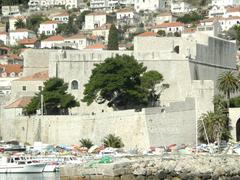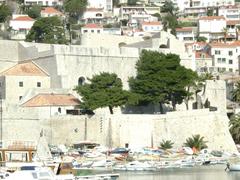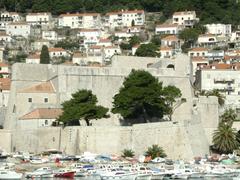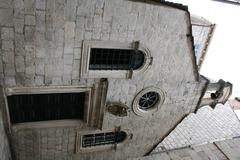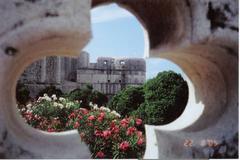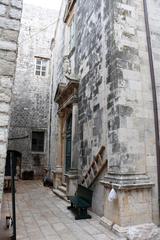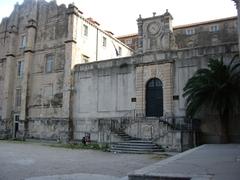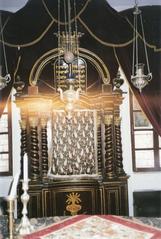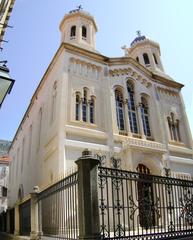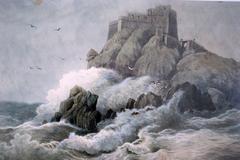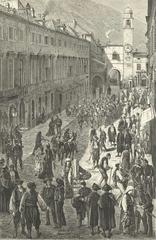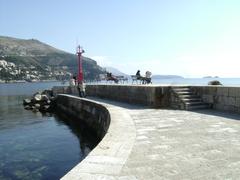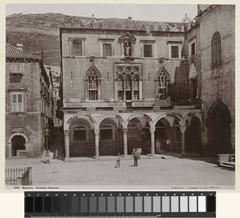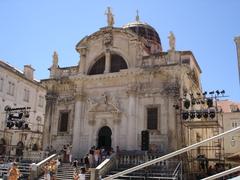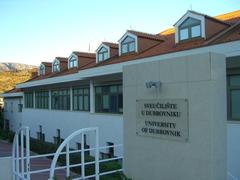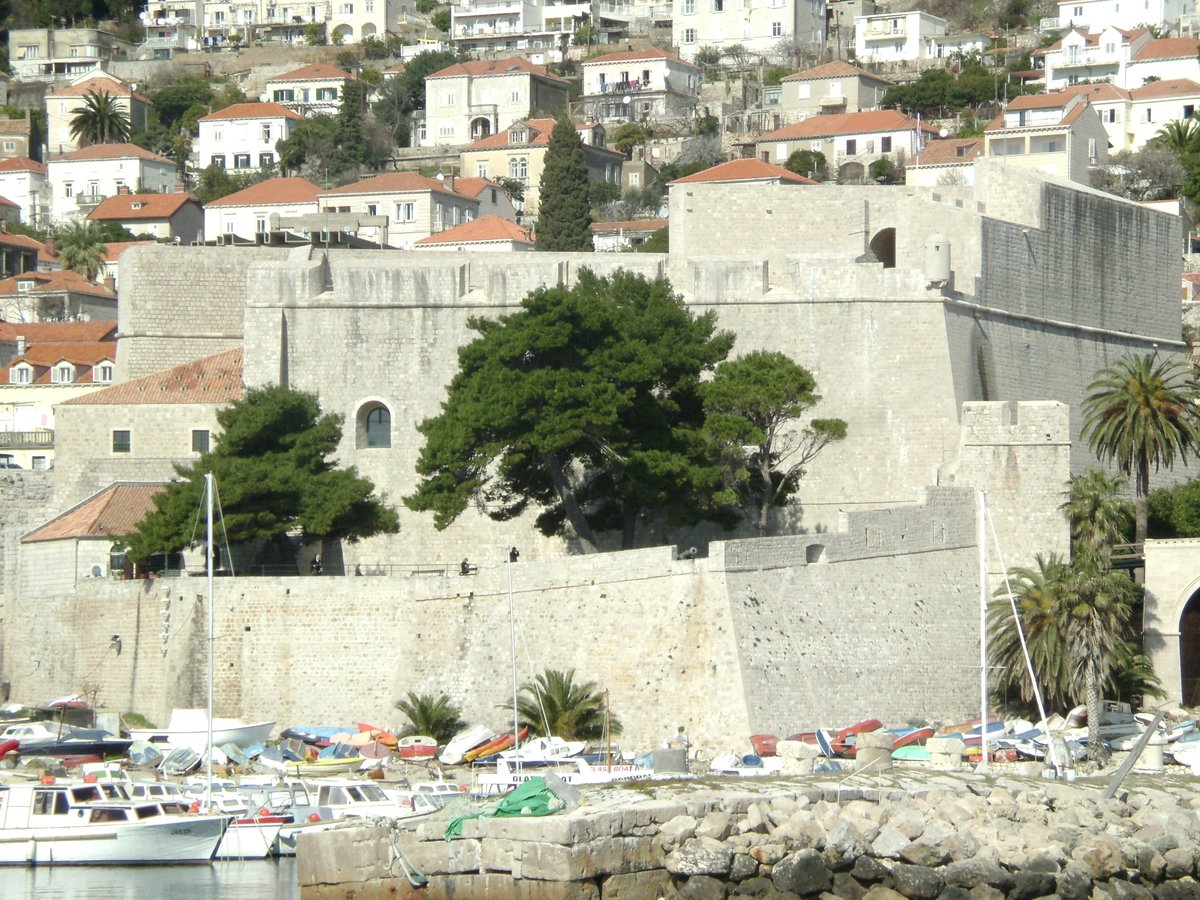
Fort Revelin Visiting Hours, Tickets, and Historical Sites in Dubrovnik
Date: 15/06/2025
Introduction to Fort Revelin
Fort Revelin stands as a formidable gateway to Dubrovnik’s Old Town, seamlessly blending centuries of military strategy, architectural prowess, and cultural vitality. Originally built in the 15th century to defend the Republic of Ragusa, the fortress was later expanded in the Renaissance under architect Antonio Ferramolino. Its robust limestone walls, up to four meters thick, helped it withstand artillery assaults and the devastating 1667 earthquake, earning it a place among the Adriatic’s most resilient fortifications. Over time, Revelin has evolved from a military stronghold and foundry into a vibrant venue for cultural events, exhibitions, and panoramic sightseeing—making it an essential stop for visitors eager to experience Dubrovnik’s rich past and dynamic present (Dubrovnik Museums; Visitteo.com; Dubrovnik City; History Hit).
Table of Contents
- Origins and Early Development
- Strategic Renaissance Expansion
- Role in Dubrovnik’s Defense Network
- Archaeological Discoveries and Ivan of Rab
- Fort Revelin Visiting Hours and Ticket Information
- Accessibility and Travel Tips
- Architecture and Preservation
- Special Events and Cultural Activities
- Nearby Attractions and City Wall Integration
- Frequently Asked Questions (FAQ)
- Visuals, Media, and Travel Resources
- Conclusion and Call to Action
- Sources and Further Reading
Origins and Early Development
The earliest fortifications on the site of Fort Revelin date to the 13th century, reflecting Dubrovnik’s growing autonomy and need for land and sea defense. Initially a modest outpost safeguarding the Ploče Gate, its strategic position quickly made it a linchpin in the city’s protective system as Dubrovnik’s trade and maritime influence expanded (Dubrovnik Museums).
Strategic Renaissance Expansion
The threat from the Ottoman Empire after the fall of Constantinople in 1453 prompted a comprehensive redesign of Dubrovnik’s defenses. In 1462, the city commissioned a major expansion of Revelin, and between 1538 and 1557, Antonio Ferramolino’s innovative designs transformed it into a state-of-the-art fortress. Massive angled bastions, thick limestone walls, and a broad artillery platform made Revelin one of the most advanced defensive structures of its time (Dubrovnik Museums).
Role in Dubrovnik’s Defense Network
Revelin’s position at the eastern entrance was crucial for protecting the vulnerable Ploče Gate and adjacent harbor. Its elevated vantage allowed defenders to monitor and repel attacks, and it served as a fallback position in case of breached outer walls. The fortress’s robust construction ensured it survived the catastrophic 1667 earthquake, unlike much of the city, and it remained a defensive stronghold through periods of Ottoman and Venetian threats.
Archaeological Discoveries and Ivan of Rab
Ongoing archaeological research and exhibitions at Revelin have revealed medieval foundations and Renaissance adaptations, including evidence of a foundry where cannons and bells were cast. This highlights Revelin’s role not just as a bastion, but as a site of military production. Ivan of Rab, a master craftsman, contributed significantly to the fort’s metalworking legacy, with artifacts and records attesting to his expertise (Dubrovnik Museums).
Fort Revelin Visiting Hours and Ticket Information
- Visiting Hours: April–October: 9:00 AM – 7:00 PM; November–March: 9:00 AM – 4:00/5:00 PM. Hours may change during holidays or events—verify on the official Dubrovnik Museums website.
- Tickets: Adult tickets are approximately 50–100 HRK, with discounts for students, seniors, and free entry for children under 7. Combined tickets for city walls and other forts are available for greater value.
- Purchase Options: Tickets can be bought at the entrance, online, or via authorized tour providers (Visitteo.com).
Accessibility and Travel Tips
- Access: The fortress is reached via a stone bridge over a dry moat; some uneven surfaces and stairs may challenge visitors with mobility needs.
- Tips: Visit early morning or late afternoon for fewer crowds and better photography. Guided tours in multiple languages are available and recommended for a richer experience.
- Facilities: Restrooms, a gift shop, and shaded rest areas are available. The Revelin Culture Club operates in the evenings, offering nightlife within the historic setting.
Architecture and Preservation
Fort Revelin exemplifies Renaissance military engineering:
- Design: Irregular quadrilateral layout, thick masonry walls, angled bastions, cannon embrasures, and loopholes for optimal defense.
- Materials: Durable local limestone, precisely fitted for earthquake resistance; barrel vaults and massive arches provide structural stability.
- Preservation: Restoration efforts focus on maintaining structural integrity while adapting the fort for public use. It is protected under UNESCO World Heritage guidelines, with ongoing conservation (VipHolidayBooker.com).
Special Events and Cultural Activities
- Dubrovnik Summer Festival: The fortress hosts concerts, theater, and the festival’s opening ceremony, making use of its dramatic terrace.
- Exhibitions: The Archaeological Museum features exhibitions on stone artistry, numismatic finds, and medieval sculpture (dumus.hr).
- Nightlife: Club Revelin operates nightly, hosting international DJs and themed parties, offering a unique blend of history and entertainment (clubrevelin.com).
Nearby Attractions and City Wall Integration
Fort Revelin is integrated with Dubrovnik’s city walls and is near:
- Ploče Gate: The main eastern entrance.
- Fort Lovrijenac and Minceta Tower: Other major fortifications accessible via the wall circuit.
- Old Town Attractions: Dominican Monastery, Sponza Palace, and Stradun pedestrian street (lonelyplanet.com).
Frequently Asked Questions (FAQ)
Q: What are Fort Revelin’s opening hours?
A: Typically 9:00 AM–7:00 PM in peak season, with shorter hours off-season. Always check official sources before visiting.
Q: How much are tickets?
A: Adults 50–100 HRK; students/seniors 50 HRK; children under 7 free. Combined tickets available.
Q: Is Fort Revelin accessible for wheelchair users?
A: Partial accessibility; main bridge is accessible, but interior stairs and uneven floors may pose challenges.
Q: Are guided tours available?
A: Yes, in multiple languages via the Dubrovnik Tourist Board or authorized operators.
Q: Can I visit as part of the city walls tour?
A: Yes, Fort Revelin is included in city walls circuit and combined tickets.
Visuals, Media, and Travel Resources
- Use high-resolution images of the fortress’s walls, terraces, and interior with descriptive alt text (“Fort Revelin Dubrovnik limestone walls,” “Panoramic view from Fort Revelin”).
- Embed interactive maps showing Revelin’s position relative to Old Town and other attractions.
- Provide links to virtual tours and video walkthroughs where available.
Conclusion and Call to Action
Fort Revelin is a testament to Dubrovnik’s enduring spirit, architectural innovation, and cultural vibrancy. From exploring centuries-old defenses and archaeological exhibits to enjoying world-class events and nightlife, the fortress offers a multifaceted experience for every visitor. For the latest visiting hours, ticket options, and event updates, consult official resources and download the Audiala app for guided tours and insider tips. Make Fort Revelin a highlight of your Dubrovnik itinerary and immerse yourself in the living history of this remarkable city.
Sources and Further Reading
- Dubrovnik Museums: Archaeological Museum – Revelin
- Visitteo: 12 Most Significant Fortresses in Croatia
- Dubrovnik City: Fortress Revelin
- History Hit: Fort Revelin
- VipHolidayBooker: 10 Things You Must Know Before Visiting Dubrovnik
- dumus.hr Archaeological Museum
- Club Revelin Events
- Lonely Planet: Fort Revelin
- Unmissable Trips: What’s Hiding Inside Dubrovnik’s City Walls
